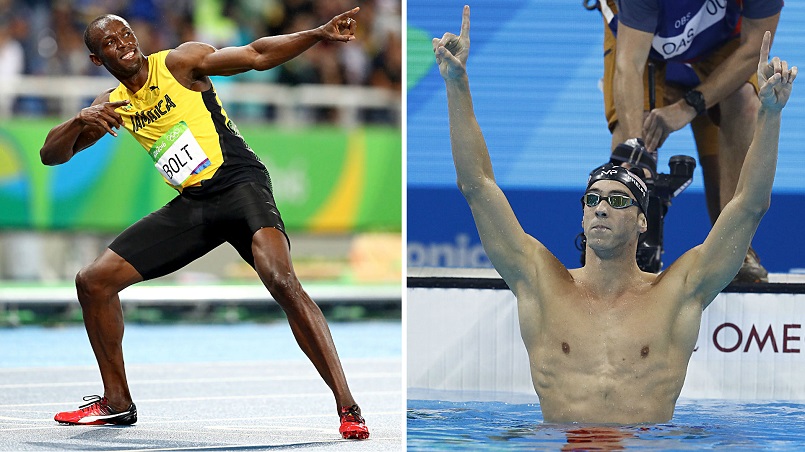
It took Usain Bolt less than 20 seconds to win his eighth gold medal as an Olympian, spread across appearances at the Games in Beijing, London and now Rio de Janeiro. If you blinked twice, you hardly saw the glory of his victory in the 200 meter dash.
Had Bolt come along as an athlete four decades earlier, though, we wouldn’t have seen him in Rio at all.
This has been the Olympics of Usain Bolt and Michael Phelps in what likely will be their final significant statements on the grandest stage their sports allow. They only are here, however, because professional athletes are allowed to compete.
So we get to see Phelps accumulate 28 Olympic medals and Bolt win every final he enters in three separate Games, with one more to come in the 4x100m relay Saturday night. We are living in the greatest Olympic era since the Games were revived 120 years ago.
There still are occasional complaints among Americans about professionals in the Olympics. Some of it is sportswriters looking for a column, but you don’t have to be a journalist to express your opinion through social media. There are assertions, for instance, that the United States ought to stop sending NBA players to compete in basketball and instead field a team of collegians. There is a nostalgia for the days of the Miracle on Ice.
During the time we have watched Bolt become the first sprinter to win three consecutive gold medals in the 100m dash, and then the first to win three consecutive golds in the 200m, and during the time we have seen Phelps win six gold medals in Athens and then eight in Beijing and four in London and five in Rio, we have been flooded with images of some of the greatest modern athletes as Olympians.
We have seen LeBron James, Serena Williams, Novak Djokovic, Mo Farah, Kerri Walsh Jennings, Marta and Gabrielle Douglas, every one of them a millionaire. And not because they inherited their money.
There was an excellent scene in Chariots of Fire, not one of my favorite movies about sports, in which the fictional character of Lord Andrew Lindsay has a servant place glasses of champagne on a series of track hurdles arranged on his estate. That way he can practice his race in advance of the 1924 Olympics; if he hits a hurdle, he spills a bit of the bubbly. It is the perfect metaphor for the scourge of amateurism that damaged the Games for so many years.
Professional sport was seen as somehow as undignified, and that persisted for many decades after British gentlemen no longer dominated track and field.
It wasn’t until 1971 that the IOC eliminated the requirement that all athletes be amateurs, and the USOC didn’t follow along until another seven years passed. Not until 1989 did FIBA vote to allow NBA players to join the myriad pros from other leagues already competing in the Olympics.
It had long been a farce to insist upon amateurism because state-sponsored athletes were continuing on through multiple Olympiads, but for decades those in capitalist countries were forced to decide whether to accept the short-term wealth possible with Olympic success or to continue on in sports, quite possibly choosing between earning a decent leaving or training at a world-class level.
So Mark Spitz left swimming at age 22, having won seven gold medals that made him a household name in 1972 and started peddling electric razors. And Bruce Jenner endured his last decathlon at the 1976 Olympics in Montreal and next was seen on a Wheaties box.
Bolt and Phelps did not have to make that choice. Each is worth more than $50 million because of his excellence as an athlete. They could continue as Olympians as long as they wanted and as long as they still record times worthy of inclusion on their national teams. In fact, they can keep going until Tokyo in 2020 if they wish, though each has expressed that retirement is imminent: Phelps now, Bolt after one more stroll through the World Championships.
There will be one last glimpse of Bolt in that relay race, most likely fewer than 10 seconds of actual running and then quite a few minutes of celebration/preening that will endear/alienate members of the stadium and television audience. We’ve seen great sprinters run at the Olympic Games over the years, but we’ve never seen anything like him.
We were blessed, though, to get the chance to watch him again and again and again.
